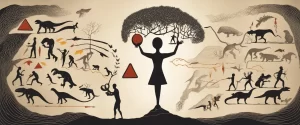——The 21 Irrefutable Laws of Leadership by John C. Maxwell & The Starfish and the Spider by Ori Brafman

In the realm of leadership literature, numerous books have been written to shed light on the various aspects and dynamics of effective leadership. Two prominent and influential works that have garnered significant attention in this domain are “The 21 Irrefutable Laws of Leadership” by John C. Maxwell and “The Starfish and the Spider” by Ori Brafman. Both books offer unique perspectives on the art of leadership, exploring different approaches and principles that leaders can employ to achieve success.
The 21 Irrefutable Laws of Leadership” by John C. Maxwell is a classic guide that has become a staple resource for aspiring and experienced leaders alike. Maxwell, an esteemed author and leadership expert, presents a comprehensive framework of 21 fundamental laws that he argues are indispensable for effective leadership. Through real-life examples, anecdotes, and practical insights, Maxwell illustrates how these laws can be applied to various organizational settings, empowering leaders to maximize their potential and influence others positively.
On the other hand, “The Starfish and the Spider” by Ori Brafman focuses on a different aspect of leadership altogether. Brafman takes a radical approach by examining decentralized leadership and the power of leaderless organizations. Through captivating storytelling and compelling case studies, he explores the remarkable success achieved by decentralization – using examples such as the Apache tribe’s resistance against the Spanish army and the rise of the file-sharing network Napster. Brafman encourages leaders to embrace a more network-based and adaptive approach, challenging traditional notions of command and control.
While both Maxwell and Brafman delve into the realm of leadership, their perspectives and proposed strategies differ significantly. Maxwell emphasizes the importance of individual leadership qualities, providing a roadmap for aspiring leaders seeking personal growth and development. On the other hand, Brafman offers a fresh perspective that challenges traditional hierarchical structures, advocating for a more horizontally organized leadership approach that emphasizes collaboration and innovation.
In this comparative study, we will delve deeper into these two influential books, examining their key principles, strategies, and applications. Through an analysis of their respective strengths and weaknesses, as well as a critical evaluation of their relevance in contemporary leadership contexts, we aim to present a comprehensive understanding of the diverse approaches to leadership provided by Maxwell and Brafman. By doing so, we hope to provide valuable insights into the complex and multifaceted world of leadership and its implications for organizations in the modern era.
Brief Summary of Two Books
The 21 Irrefutable Laws of Leadership by John C. Maxwell
The 21 Irrefutable Laws of Leadership” by John C. Maxwell is a comprehensive guidebook that explores the essential principles of effective leadership. Maxwell argues that leadership is not just about holding a position or title; it is about influencing others and making a positive impact.
The book presents a collection of 21 core laws that every leader should understand and apply in their daily lives. These laws are based on Maxwell’s decades of experience in leadership development and his observation of successful leaders throughout history.
Each law is discussed in detail, offering real-life examples, anecdotes, and insightful stories from well-known leaders in various fields. Maxwell covers a wide range of topics, including the law of influence, the law of navigation, the law of sacrifice, the law of timing, the law of intuition, and many more.
By understanding and putting these laws into practice, readers can enhance their leadership skills and become more effective in guiding and motivating others. Maxwell emphasizes the importance of personal growth, character development, and investing in relationships as key factors in successful leadership.
The 21 Irrefutable Laws of Leadership” is not just a theoretical exploration of leadership principles; it provides practical tools and actionable strategies that can be implemented by leaders at any level. The book serves as a valuable resource for aspiring leaders, current leaders looking to refine their abilities, and anyone else interested in understanding the fundamental principles of effective leadership.
The Starfish and the Spider by Ori Brafman
“The Starfish and the Spider” by Ori Brafman is a book that explores the power and effectiveness of decentralized organizations. The book uses the analogy of a starfish and a spider to explain two different types of organizations.
A spider represents a traditional, centralized organization with a clear hierarchy and leadership. It has a central control, and cutting off its head (leader) can cause the organization to collapse. On the other hand, a starfish represents a decentralized organization without a clear central leader. If you cut off one of its arms, it can easily regenerate, demonstrating its resilience and adaptability.
The book reveals how decentralized organizations have emerged and thrived in various sectors, such as the Alcoholics Anonymous, Craigslist, and the Apache Indian tribe. It explores the principles that make these organizations successful, including the concepts of autonomy and empowerment, the power of peer-to-peer relationships, and the ability to self-organize.
Through real-life examples and engaging stories, the author highlights the advantages of decentralized organizations in the modern world. He argues that these organizations are not only more resilient to external shocks but also better equipped to innovate and adapt to change. Brafman also provides practical insights for both individuals and traditional organizations on how to embrace decentralized models of operation.
Overall, “The Starfish and the Spider” is a thought-provoking book that challenges traditional notions of leadership and organization. It demonstrates how decentralized organizations can be powerful agents of change, revolutionizing industries and transforming communities.
Comparison between Two Books

Similarities in Leadership
Both “The 21 Irrefutable Laws of Leadership” by John C. Maxwell and “The Starfish and the Spider” by Ori Brafman discuss various aspects of leadership and provide valuable insights into the subject. Although the approaches and perspectives may differ, there are several similarities when it comes to leadership highlighted in these books.
1. Importance of influence: Both books emphasize the significance of leadership as the ability to influence others. Maxwell asserts that leadership is not about a position or title, but about how effectively one can impact and guide others. Brafman discusses the decentralized leadership model and how influence can spread through a collective effort rather than relying solely on a central authority.
2. Focus on relationships: Both authors highlight the significance of building and nurturing relationships as a leader. Maxwell talks about the importance of connecting with people on a personal level, understanding their needs and aspirations, and creating a sense of trust. Similarly, Brafman emphasizes the power of relationships and how they can contribute to the success of an organization or movement.
3. Adaptability and flexibility: Both books recognize the need for leaders to be adaptable and flexible in their approach. Maxwell discusses the law of flexibility, emphasizing that effective leaders must be willing to adapt to changing circumstances and seize new opportunities. Brafman also stresses the importance of adaptability, explaining how decentralized organizations can thrive by being resilient and embracing change.
4. Vision and purpose: Both authors emphasize the significance of having a clear vision and purpose as a leader. Maxwell discusses the law of the buy-in, emphasizing the importance of aligning individuals with a shared vision to inspire them. Similarly, Brafman highlights the importance of a compelling purpose that motivates individuals to take ownership and contribute to the collective mission.
5. Empowerment and decentralization: Both books touch upon the concept of empowering individuals and promoting decentralization in leadership. Maxwell suggests that effective leaders empower others by delegating authority, trusting their team, and providing opportunities for growth. Brafman explores the decentralized leadership model, illustrating how decentralized organizations can harness the power of individuals and create a self-sustaining ecosystem.
6. Continuous learning and development: Both authors stress the importance of continuous learning and development for leaders. Maxwell encourages leaders to cultivate a growth mindset, seek feedback, and invest in personal development. Brafman emphasizes the need for leaders to be open to learning from various sources, embracing diversity and unconventional ideas to thrive in a decentralized environment.
While these books may present their ideas from different perspectives, they both highlight the importance of influence, relationships, adaptability, vision, empowerment, and continuous learning in leadership.
Divergences in Leadership
“The 21 Irrefutable Laws of Leadership” by John C. Maxwell and “The Starfish and the Spider” by Ori Brafman are two highly influential books on leadership, but they take different approaches and present different perspectives on the subject. Here are the key divergences about leadership in these books:
1. Leadership Style: Maxwell’s book focuses on the traits, skills, and behaviors of effective leaders. He outlines 21 laws that leaders should develop and practice to be successful, such as the Law of Influence, Law of Navigation, and Law of Empowerment. On the other hand, Brafman’s book emphasizes a different aspect of leadership – decentralized leadership. He argues that in today’s interconnected world, traditional hierarchical leadership may not always be effective. Instead, he explores the power of leaderless organizations and how leaders can thrive in decentralized systems.
2. Structure vs. Decentralization: Maxwell’s book advocates for a structured leadership approach where leaders guide and motivate their followers towards a common goal. He emphasizes the importance of hierarchy, order, and accountability in any leadership setting. In contrast, Brafman’s book challenges the notion of traditional organizational structures and points out the advantages of decentralized, non-hierarchical systems. Brafman discusses examples of decentralized organizations like Alcoholics Anonymous, Wikipedia, and the Apache Indians, where power is distributed and decision-making authority is widely shared.
3. Individual vs. Collective: Maxwell’s book primarily focuses on the individual leader and their personal development. He emphasizes self-awareness, character building, and the cultivation of leadership skills. Maxwell’s approach sees leadership as primarily an individual endeavor. On the other hand, Brafman’s book zooms out to explore leadership within the context of a group or organization. He examines how collective intelligence and collaboration can drive successful leadership, challenging the notion that leadership is solely the responsibility of individual leaders.
4. Change and Adaptability: Maxwell’s book acknowledges the need for leaders to adapt and learn from their experiences, but the focus is more on utilizing timeless leadership principles. The laws he outlines are seen as fundamental and applicable across different times and contexts. However, Brafman’s book emphasizes the need for leaders to be adaptive and flexible in the face of rapid change and uncertainty. The decentralized model of leadership that Brafman proposes is inherently more adaptable and better suited to navigating complex and unpredictable situations.
In conclusion, while both books offer valuable insights into leadership, they diverge in their approaches. “The 21 Irrefutable Laws of Leadership” takes a structured and individual-focused approach, whereas “The Starfish and the Spider” advocates for decentralized leadership and collective intelligence. These divergences provide readers with different perspectives on leadership, allowing them to explore which style may be most suitable for their specific context.

Conclusion
Both books have their own merits and offer valuable insights, but the choice ultimately depends on your personal preferences and areas of interest.
“The 21 Irrefutable Laws of Leadership” by John C. Maxwell is a classic in the field of leadership development. It presents 21 principles or laws that Maxwell believes are essential for effective leadership. The book provides practical examples and anecdotes, making it accessible and easy to apply in various leadership situations. If you are interested in honing your leadership skills and learning from a renowned leadership expert, this book would be a great choice.
“The Starfish and the Spider” by Ori Brafman takes a different approach to leadership and organizational dynamics. It explores the concept of decentralized organizations and the power of leaderless movements. Through captivating stories and case studies, Brafman highlights the advantages and challenges of decentralized structures and how they can create resilient and innovative organizations. If you are interested in non-traditional models of leadership and how they can lead to success, this book might be more suitable for you.
Ultimately, both books offer valuable insights into leadership, but they approach the topic from different angles. Consider your own interests and goals to determine which book aligns more with your needs.


